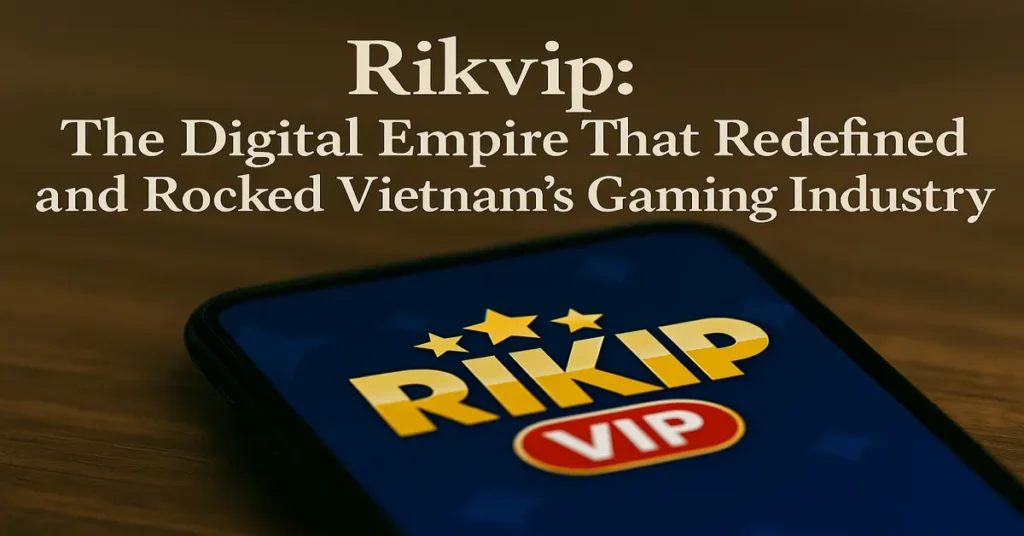In the early 2010s, while much of the world’s attention was fixed on Silicon Valley’s unicorns and China’s growing tech giants, a quieter, but no less significant, digital phenomenon was unfolding in Southeast Asia.
At the center of it stood Rikvip — a Vietnamese online gaming platform that would, at its peak, draw millions of users and billions of dong in revenue, only to collapse spectacularly under the weight of scandal.
The story of Rikvip is not simply a tale of greed or hubris.
It is a complex portrait of technology’s double-edged sword: how innovation can foster both community and corruption, entertainment and exploitation, opportunity and chaos.
Today, understanding the rise and fall of Rikvip offers critical lessons about digital governance, the social fabric of emerging economies, and the profound responsibilities that come with building worlds online.
The Birth of Rikvip: Gaming Meets Gambling
In its earliest incarnation, Rikvip presented itself as a social gaming platform — a place where players could enjoy virtual versions of popular games like poker, bai cao, and tien len.
On the surface, it resembled thousands of other digital gaming hubs cropping up across Asia.
But Rikvip introduced a subtle — and potent — innovation:
While users played with virtual currency, they could easily convert real money into in-game credits and vice versa, often through third-party intermediaries.
The line between gaming and gambling blurred quickly.
What Set Rikvip Apart?
- User-Friendly Interface:
Rikvip was sleek, mobile-optimized, and incredibly easy to navigate — appealing to a broad demographic. - Microtransaction Economy:
Users were encouraged to buy small amounts of game credits regularly, a model that built psychological habit loops. - Decentralized Payment Networks:
Rather than traditional banking, Rikvip relied heavily on prepaid cards, mobile top-ups, and shadowy cash agents. - Social Integration:
Leaderboards, chatrooms, and “friend” features turned isolated gaming into communal competition — and addiction.
By 2015, Rikvip was drawing an estimated 43 million registered users — a staggering number in a country of about 90 million.
The Legal Grey Zone: Loopholes and Lax Oversight
In Vietnam, gambling is heavily regulated, largely confined to state-sponsored lotteries and select government-approved casinos.
But online gaming operated in a murky twilight.
At the time of Rikvip’s explosive growth, Vietnamese cybercrime laws were still evolving.
Gaming companies exploited gaps:
- Framing gambling as “entertainment”:
Rikvip described itself as offering games of “skill,” rather than chance. - Third-Party Responsibility:
Cash-out systems were operated by affiliates and vendors, allowing Rikvip to claim plausible deniability. - International Hosting:
Servers and technical infrastructure were often located outside Vietnam’s jurisdiction.
This legal ambiguity allowed Rikvip to flourish — but also sowed the seeds for its eventual downfall.
Social Impact: The Gamification of Everyday Life
As Rikvip grew, its influence rippled across Vietnamese society.
1. Youth Engagement
Young people — drawn by the promise of easy money and social status — formed the platform’s core user base.
Cafés, university dorms, and even offices buzzed with whispered tips and strategies.
2. Family Finances
Microtransactions led many users to overspend.
Reports began surfacing of individuals losing entire monthly salaries — or worse, life savings — chasing virtual jackpots.
3. Underground Economy
Local “card agents” emerged — individuals who bought and sold Rikvip credits for cash, often at a premium.
These networks operated semi-legally, fueling a parallel financial system difficult to regulate.
4. Organized Crime Links
Authorities later uncovered that organized crime groups used Rikvip and similar platforms for money laundering and recruitment.
What began as simple online gaming had metastasized into something far more dangerous.
The Scandal Breaks: Investigations, Arrests, and Fallout
In 2018, Vietnamese police launched a sweeping investigation into online gambling platforms — and Rikvip was the crown jewel.
The findings stunned the nation:
- Hundreds of arrests:
Including developers, administrators, financial handlers, and minor public officials. - Seizure of evidence:
Bank accounts, luxury cars, real estate, and massive stockpiles of cash. - Government Links:
Shockingly, two high-ranking officials from the Ministry of Public Security were implicated, accused of taking bribes and protecting Rikvip’s operations.
The figures were jaw-dropping:
- Over $420 million USD was estimated to have flowed through Rikvip.
- Millions of players had participated in what authorities classified as “illegal gambling.”
Public outrage was swift.
Vietnam’s government, facing pressure to control corruption and assert digital sovereignty, responded with mass trials, strict new cybersecurity laws, and highly visible reforms.
The Technology Behind Rikvip: How Innovation Enabled Scale
At its core, Rikvip’s success — and eventual exposure — was powered by technology.
1. Scalable Architecture
Cloud hosting and modular software allowed Rikvip to handle millions of concurrent users without crashes — rare among domestic Vietnamese tech platforms at the time.
2. Secure Payments (For Users, Not Regulators)
Encryption and decentralized transactions protected users’ data, making traditional law enforcement surveillance difficult.
3. Viral Marketing Algorithms
Rikvip’s growth owed much to algorithmic targeting — using social network connections to encourage viral invitations, referrals, and retention.
4. Bot Management
To maintain the illusion of bustling tables, Rikvip employed AI-powered bots — fake players who kept games lively and tempting.
The same tools that made Rikvip efficient also made it hard to regulate, trace, or dismantle.
A Broader Phenomenon: Digital Gambling Worldwide
Rikvip is not an isolated case.
Around the world, digital gambling — both legal and illegal — has exploded:
- China:
Authorities continue cat-and-mouse chases with underground betting apps. - Philippines:
Online casinos, some illicit, operate in sprawling gray markets known as POGOs (Philippine Offshore Gaming Operators). - United States:
States legalize online sports betting while grappling with fraud and addiction concerns.
The global market for online gambling is projected to reach $127 billion USD by 2027, according to industry estimates.
Rikvip’s rise and fall thus mirrors larger patterns:
Where regulation lags, innovation fills the vacuum — for better and worse.
Cultural Reflections: Risk, Reward, and Modern Vietnamese Identity
Rikvip also reveals something deeper about Vietnam’s social evolution.
A traditionally Confucian society, Vietnam prizes discipline, community welfare, and social harmony.
Yet rapid economic liberalization — often called “Đổi Mới 2.0” — has ushered in an era of individual ambition, entrepreneurialism, and risk-taking.
For many young Vietnamese, Rikvip offered:
- A Shortcut:
A way to wealth faster than traditional hard work allowed. - A Game:
A harmless-seeming form of entertainment in an increasingly gamified culture. - A Rebellion:
A subtle act of defiance against social expectations.
Thus, Rikvip was not simply a platform; it was a cultural phenomenon — one that exposed both the aspirations and anxieties of a society hurtling into the 21st century.
What Has Changed Since the Fall?
Vietnamese regulators, stunned by the scale of Rikvip’s network, have since:
- Tightened Cybersecurity Laws:
Including requiring domestic data storage for tech companies. - Expanded Financial Surveillance:
Mandating stricter reporting by mobile payment platforms and e-wallets. - Criminalized Unauthorized Online Gaming More Severely:
New amendments increase penalties for both players and providers.
Yet critics argue that enforcement remains uneven, and that as long as economic disparities persist, demand for high-risk, high-reward platforms will continue.
Looking Ahead: The Future of Online Gaming in Southeast Asia
The Rikvip scandal could have destroyed Vietnam’s digital economy aspirations.
Instead, it forced a reckoning — one that may ultimately yield a more mature, resilient online ecosystem.
Trends to watch:
- Licensed Digital Casinos:
Vietnam is cautiously piloting legal online gambling for domestic players under strict conditions. - Esports and Skill Gaming:
A pivot toward games emphasizing skill over luck may soften regulatory concerns. - Blockchain and NFTs:
Emerging Vietnamese tech start-ups are exploring decentralized gaming economies to avoid pitfalls of fiat-based systems.
In the balance lies a question that every emerging economy must grapple with:
How can a society nurture innovation while protecting its citizens from the darker instincts that technology can unleash?
Conclusion: Rikvip’s Legacy — Warning or Blueprint?
Rikvip is no longer operational.
Its founders are behind bars; its fortune scattered.
Yet its legacy endures — not just in news archives, but in every debate about digital trust, economic opportunity, and personal freedom online.
Was Rikvip merely a cautionary tale?
Or was it a glimpse of an inevitable future — a future where lines blur, systems strain, and societies must race to catch up?
The answer, perhaps, is both.
And as new platforms rise, new risks emerge, and new digital empires are built, the ghost of Rikvip lingers — a reminder that in the virtual world, nothing is ever truly erased.







